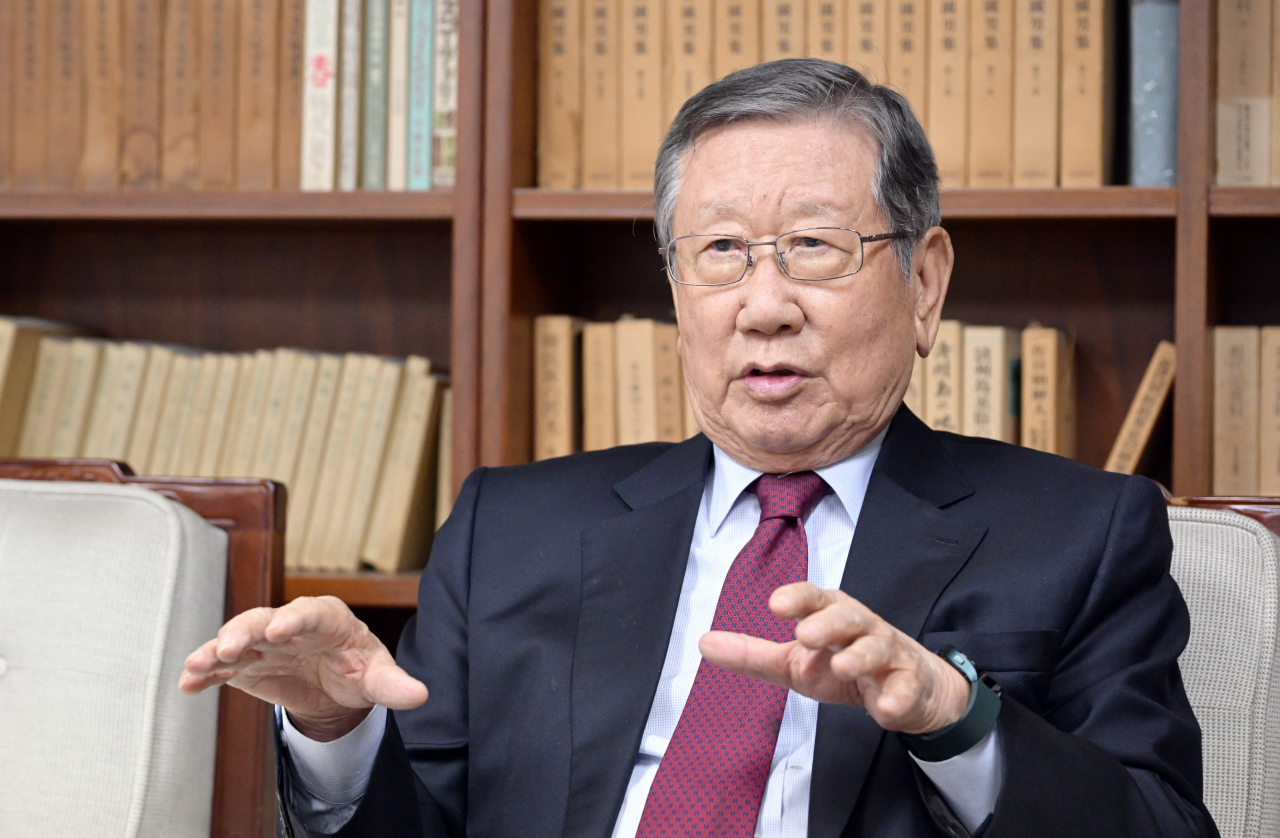[S. Korea-Japan Reboot] Time to put history behind us for good: ex-envoy
By Choi Si-youngPublished : Jan. 18, 2023 - 15:37

This is the last installment of the three-part interview series exploring what experts believe should take place for S. Korea to better advance its interests, while resetting ties with Japan amid disputes. -- Ed.
aaaaa
It is in South Korea’s best interests to bring closure to the dispute with Japan over making amends to Koreans forced into labor by Japanese firms during World War II. Only then will Seoul be able to take advantage of all the help it needs from Tokyo as it combats regional challenges, according to Yoo Heung-soo, a former South Korean ambassador to Japan.
“We have to look at what the future holds for us and the two countries once we move past what we have been doing for these past years,” the former envoy said in an interview with The Korea Herald last week. Yoo is the president of the Korea-Japan Friendship Association, a local group promoting ties.
Currently, Korea and Japan are nearing a compromise deal to compensate victims -- a job seen as nearly impossible after Korea’s top court held Japanese firms liable for damages in October 2018. Since then, Tokyo has refused to recognize the ruling, citing a 1965 treaty that normalized the two countries’ relations following Japan’s 1910-45 colonial rule of the Korean Peninsula.
A four-term lawmaker who chaired a coalition of Korean and Japanese lawmakers on bilateral relations from 2000 to 2004, Yoo described the compromise the Korean government is pursuing as a realistic approach that can also deliver the consolation victims need. The plan involves having the Korean government or companies pay the victims while awaiting Japan’s “sincere response,” which is being debated between the two countries, according to Seoul’s Foreign Ministry this week.
A senior ministry official elaborated, saying the discussion involved “apology and contribution to compensation.” That is almost identical to what victims have long demanded, though they seek compensation directly from Japan.
“If the majority of victims could come to terms with that, I think we could and should move on,” Yoo said, noting this kind of closure does not mean Korea is letting Japan have its way on the issue. Critics have said Tokyo should be more forthright in its apology and compensation, but even some of them acknowledge that it is not actually enforceable.
Once an agreement is reached, Yoo added, Korea will have shown enough initiative to mend longtime wounds. That would provide the momentum Seoul needs to get what it wants from Tokyo on other regional concerns, such as urgent joint work on containing an increasingly aggressive North Korea. The isolated country fired off a record number of missile tests last year and shows no sign of dialing down aggression.
In response, a military coalition comprising South Korea, Japan and the US is stepping up efforts to rein in the regime, with Washington, which has led the three-way cooperation, openly calling for closer military ties to better deter Pyongyang. The US has avoided getting overly invested in the dispute out of fear that unwarranted intervention could render reconciliation much harder.
“We have to think about where we want to be, doing what we want to do in the decades to come, with the North Korean threat still hanging over our heads,” Yoo said of doubling down on efforts to counter South Korea’s biggest security threat alongside its biggest ally, the US.
But in no way should any potential pact on forced labor be used as a bargaining chip to bring about an enhanced partnership between Seoul and Tokyo, Yoo stressed. Skeptics have floated concerns about Seoul being overly soft on dispute settlement in return for Tokyo’s support in other endeavors Korea sees potentially more pressing to its interests.
The so-called “future-oriented” approach -- a term that often garners public disapproval because people believe it is used to legitimize government action regardless of public support -- is not something disagreeable by nature, according to Yoo.
“It could be the kind of thinking that leaves all of us better off, both the country and the people, eventually,” he said.








![[Graphic News] More Koreans say they plan long-distance trips this year](http://res.heraldm.com/phpwas/restmb_idxmake.php?idx=644&simg=/content/image/2024/04/17/20240417050828_0.gif&u=)
![[KH Explains] Hyundai's full hybrid edge to pay off amid slow transition to pure EVs](http://res.heraldm.com/phpwas/restmb_idxmake.php?idx=644&simg=/content/image/2024/04/18/20240418050645_0.jpg&u=20240419100350)








![[KH Explains] Hyundai's full hybrid edge to pay off amid slow transition to pure EVs](http://res.heraldm.com/phpwas/restmb_idxmake.php?idx=652&simg=/content/image/2024/04/18/20240418050645_0.jpg&u=20240419100350)

![[Today’s K-pop] Illit drops debut single remix](http://res.heraldm.com/phpwas/restmb_idxmake.php?idx=642&simg=/content/image/2024/04/19/20240419050612_0.jpg&u=)